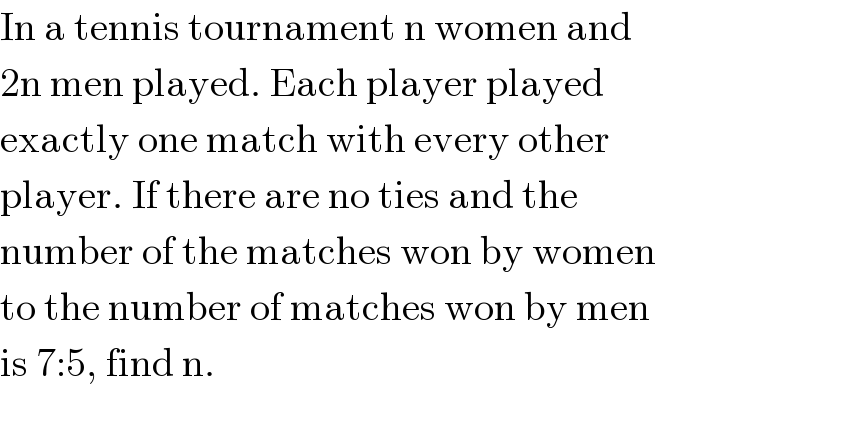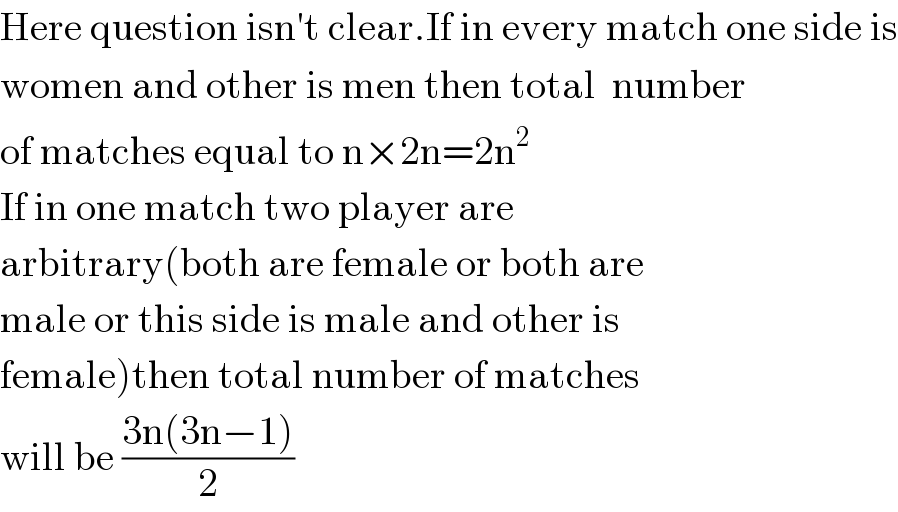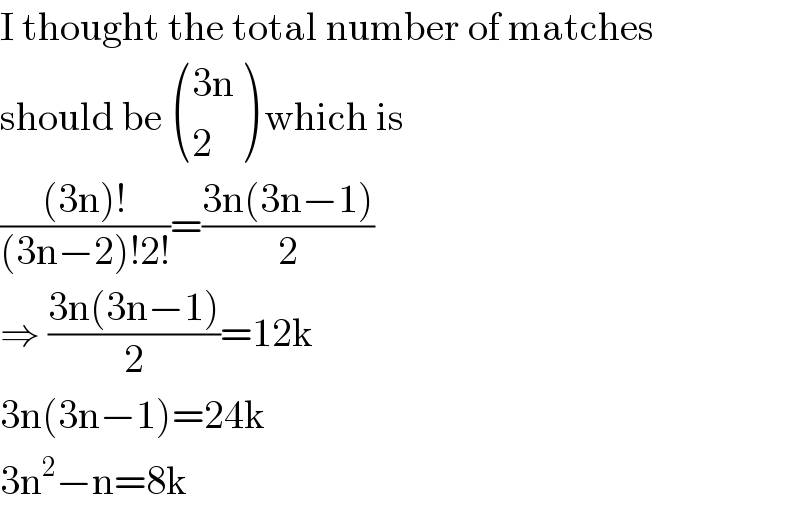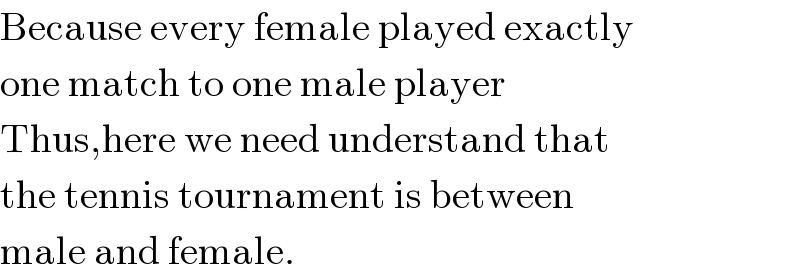
Previous in Permutation and Combination Next in Permutation and Combination
Question Number 111275 by Aina Samuel Temidayo last updated on 03/Sep/20

$$\mathrm{In}\:\mathrm{a}\:\mathrm{tennis}\:\mathrm{tournament}\:\mathrm{n}\:\mathrm{women}\:\mathrm{and} \\ $$$$\mathrm{2n}\:\mathrm{men}\:\mathrm{played}.\:\mathrm{Each}\:\mathrm{player}\:\mathrm{played} \\ $$$$\mathrm{exactly}\:\mathrm{one}\:\mathrm{match}\:\mathrm{with}\:\mathrm{every}\:\mathrm{other} \\ $$$$\mathrm{player}.\:\mathrm{If}\:\mathrm{there}\:\mathrm{are}\:\mathrm{no}\:\mathrm{ties}\:\mathrm{and}\:\mathrm{the} \\ $$$$\mathrm{number}\:\mathrm{of}\:\mathrm{the}\:\mathrm{matches}\:\mathrm{won}\:\mathrm{by}\:\mathrm{women} \\ $$$$\mathrm{to}\:\mathrm{the}\:\mathrm{number}\:\mathrm{of}\:\mathrm{matches}\:\mathrm{won}\:\mathrm{by}\:\mathrm{men} \\ $$$$\mathrm{is}\:\mathrm{7}:\mathrm{5},\:\mathrm{find}\:\mathrm{n}. \\ $$$$ \\ $$
Answered by 1549442205PVT last updated on 04/Sep/20

$$\:\:\mathrm{Since}\:\mathrm{every}\:\mathrm{player}\:\mathrm{played}\:\mathrm{exactly} \\ $$$$\:\mathrm{one}\:\mathrm{match}\:\mathrm{with}\:\mathrm{every}\:\mathrm{other}\:\mathrm{player}, \\ $$$$\left.\mathrm{i}\right)\mathrm{Case}\:\mathrm{in}\:\mathrm{every}\:\mathrm{match}\:\mathrm{one}\:\mathrm{side}\:\mathrm{is}\:\mathrm{men} \\ $$$$\mathrm{other}\:\mathrm{side}\:\mathrm{is}\:\mathrm{women}.\mathrm{Then} \\ $$$$\mathrm{total}\:\mathrm{number}\:\mathrm{of}\:\mathrm{matches}\:\mathrm{of}\:\mathrm{the}\:\mathrm{tournamen} \\ $$$$\mathrm{equal}\:\mathrm{to}\:\mathrm{n}×\mathrm{2n}=\mathrm{2n}^{\mathrm{2}} .\mathrm{From}\:\mathrm{the}\:\mathrm{hypothesis} \\ $$$$\mathrm{number}\:\mathrm{of}\:\mathrm{the}\:\mathrm{matches}\:\mathrm{won}\:\mathrm{by}\:\mathrm{women} \\ $$$$\mathrm{to}\:\mathrm{the}\:\mathrm{number}\:\mathrm{of}\:\mathrm{matches}\:\mathrm{won}\:\mathrm{by}\:\mathrm{men} \\ $$$$\mathrm{is}\:\mathrm{7}:\mathrm{5}\:\mathrm{and}\:\mathrm{there}\:\mathrm{are}\:\mathrm{no}\:\mathrm{ties}\:\mathrm{we}\:\mathrm{infer}\:\mathrm{that} \\ $$$$\mathrm{if}\:\mathrm{denote}\:\mathrm{7k}\:\mathrm{be} \\ $$$$\mathrm{number}\:\mathrm{of}\:\mathrm{the}\:\mathrm{matches}\:\mathrm{won}\:\mathrm{by}\:\mathrm{women} \\ $$$$\mathrm{then}\:\mathrm{5k}\:\mathrm{be} \\ $$$$\mathrm{number}\:\mathrm{of}\:\mathrm{the}\:\mathrm{matches}\:\mathrm{won}\:\mathrm{by}\:\mathrm{men} \\ $$$$\mathrm{Therefore}\:\mathrm{2n}^{\mathrm{2}} =\mathrm{7k}+\mathrm{5k}=\mathrm{12k}\Leftrightarrow\mathrm{n}^{\mathrm{2}} =\mathrm{6k} \\ $$$$\Rightarrow\mathrm{n}^{\mathrm{2}} \vdots\mathrm{3}\:\Rightarrow\mathrm{n}=\mathrm{3q}\Rightarrow\left(\mathrm{3q}\right)^{\mathrm{2}} =\mathrm{6k} \\ $$$$\Rightarrow\mathrm{3q}^{\mathrm{2}} =\mathrm{2k}\:\Rightarrow\mathrm{q}\vdots\mathrm{2},\mathrm{so}\:\mathrm{q}=\mathrm{2p} \\ $$$$\Rightarrow\mathrm{3}\left(\mathrm{2p}\right)^{\mathrm{2}} =\mathrm{2k}\Rightarrow\mathrm{k}=\mathrm{6p}^{\mathrm{2}} \\ $$$$\Rightarrow\mathrm{n}^{\mathrm{2}} =\mathrm{6}.\mathrm{6p}^{\mathrm{2}\:} \Rightarrow\mathrm{n}=\mathrm{6p}\:\mathrm{where}\:\mathrm{p}\:\in\mathbb{N}^{\ast} \\ $$$$\boldsymbol{\mathrm{Thus}},\mathrm{n}=\mathrm{6},\mathrm{12},\mathrm{18},... \\ $$$$\left.\mathrm{ii}\right)\mathrm{Case}\:\mathrm{in}\:\mathrm{every}\:\mathrm{match}\:\mathrm{two}\:\mathrm{players}\:\mathrm{are} \\ $$$$\mathrm{arbitrary}\:\mathrm{sex}.\mathrm{Total}\:\mathrm{number}\:\mathrm{of}\:\mathrm{player} \\ $$$$\mathrm{parting}\:\mathrm{in}\:\mathrm{tournament}\:\mathrm{is}\:\mathrm{3n}\:\mathrm{person} \\ $$$$.\mathrm{Since}\:\mathrm{every}\:\mathrm{player}\:\mathrm{played}\:\mathrm{exactly}\:\mathrm{one} \\ $$$$\mathrm{match}\:\mathrm{to}\:\mathrm{3n}−\mathrm{1}\:\mathrm{other}\:\mathrm{players}\:,\mathrm{total} \\ $$$$\mathrm{number}\:\mathrm{of}\:\mathrm{the}\:\mathrm{matches}\:\mathrm{is}\:\frac{\mathrm{3n}\left(\mathrm{3n}−\mathrm{1}\right)}{\mathrm{2}} \\ $$$$\mathrm{Therefore}\:\mathrm{we}\:\mathrm{have}\:\:\frac{\mathrm{3n}\left(\mathrm{3n}−\mathrm{1}\right)}{\mathrm{2}}=\mathrm{12k}\left(\ast\right) \\ $$$$\mathrm{We}\:\mathrm{prove}\:\mathrm{that}\:\mathrm{capacity}\:\mathrm{don}'\mathrm{t}\:\mathrm{ocurrs} \\ $$$$\mathrm{Indeed},\mathrm{number}\:\mathrm{of}\:\mathrm{matches}\:\mathrm{between} \\ $$$$\mathrm{one}\:\mathrm{side}\:\mathrm{is}\:\mathrm{female}\:\mathrm{and}\:\mathrm{the}\:\mathrm{other}\:\mathrm{side} \\ $$$$\mathrm{is}\:\mathrm{male}\:\mathrm{is}\:\mathrm{n}×\mathrm{2n}=\mathrm{2n}^{\mathrm{2}} .\mathrm{Number}\:\mathrm{of} \\ $$$$\mathrm{matches}\:\mathrm{between}\:\mathrm{two}\:\mathrm{female}\:\:\mathrm{players}\: \\ $$$$\mathrm{is}\:\frac{\mathrm{n}\left(\mathrm{n}−\mathrm{1}\right)}{\mathrm{2}}.\mathrm{Number}\:\mathrm{of}\:\mathrm{matches} \\ $$$$\mathrm{between}\:\mathrm{two}\:\mathrm{male}\:\mathrm{players}\:\mathrm{is}\:\frac{\mathrm{2n}\left(\mathrm{2n}−\mathrm{1}\right)}{\mathrm{2}} \\ $$$$\mathrm{Hence},\:\mathrm{number}\:\mathrm{of}\:\mathrm{matches}\:\mathrm{that}\:\mathrm{involving} \\ $$$$\mathrm{female}\:\mathrm{players}\:\mathrm{is}\:\mathrm{A}=\mathrm{2n}^{\mathrm{2}} +\frac{\mathrm{n}\left(\mathrm{n}−\mathrm{1}\right)}{\mathrm{2}}. \\ $$$$\:\mathrm{Number}\:\mathrm{of}\:\mathrm{matches}\:\mathrm{that}\:\mathrm{involving} \\ $$$$\mathrm{male}\:\mathrm{players}\:\mathrm{is}\:\mathrm{B}=\mathrm{2n}^{\mathrm{2}} +\frac{\mathrm{2n}\left(\mathrm{2n}−\mathrm{1}\right)}{\mathrm{2}} \\ $$$$\mathrm{It}\:\mathrm{is}\:\mathrm{easy}\:\mathrm{to}\:\mathrm{see}\:\mathrm{that}\:\frac{\mathrm{A}}{\mathrm{B}}<\mathrm{1}.\mathrm{Therefore} \\ $$$$\mathrm{don}'\mathrm{t}\:\mathrm{ocurrs}\:\mathrm{case}\:\mathrm{that}\:\mathrm{A}:\mathrm{B}=\mathrm{7}:\mathrm{5} \\ $$
Commented by 1549442205PVT last updated on 04/Sep/20

$$\mathrm{Here}\:\mathrm{question}\:\mathrm{isn}'\mathrm{t}\:\mathrm{clear}.\mathrm{If}\:\mathrm{in}\:\mathrm{every}\:\mathrm{match}\:\mathrm{one}\:\mathrm{side}\:\mathrm{is} \\ $$$$\mathrm{women}\:\mathrm{and}\:\mathrm{other}\:\mathrm{is}\:\mathrm{men}\:\mathrm{then}\:\mathrm{total}\:\:\mathrm{number} \\ $$$$\mathrm{of}\:\mathrm{matches}\:\mathrm{equal}\:\mathrm{to}\:\mathrm{n}×\mathrm{2n}=\mathrm{2n}^{\mathrm{2}} \\ $$$$\mathrm{If}\:\mathrm{in}\:\mathrm{one}\:\mathrm{match}\:\mathrm{two}\:\mathrm{player}\:\mathrm{are} \\ $$$$\mathrm{arbitrary}\left(\mathrm{both}\:\mathrm{are}\:\mathrm{female}\:\mathrm{or}\:\mathrm{both}\:\mathrm{are}\right. \\ $$$$\mathrm{male}\:\mathrm{or}\:\mathrm{this}\:\mathrm{side}\:\mathrm{is}\:\mathrm{male}\:\mathrm{and}\:\mathrm{other}\:\mathrm{is} \\ $$$$\left.\mathrm{female}\right)\mathrm{then}\:\mathrm{total}\:\mathrm{number}\:\mathrm{of}\:\mathrm{matches} \\ $$$$\mathrm{will}\:\mathrm{be}\:\frac{\mathrm{3n}\left(\mathrm{3n}−\mathrm{1}\right)}{\mathrm{2}} \\ $$
Commented by Aina Samuel Temidayo last updated on 03/Sep/20

$$\mathrm{I}\:\mathrm{thought}\:\mathrm{the}\:\mathrm{total}\:\mathrm{number}\:\mathrm{of}\:\mathrm{matches} \\ $$$$\mathrm{should}\:\mathrm{be}\:\begin{pmatrix}{\mathrm{3n}}\\{\mathrm{2}}\end{pmatrix}\:\mathrm{which}\:\mathrm{is} \\ $$$$\frac{\left(\mathrm{3n}\right)!}{\left(\mathrm{3n}−\mathrm{2}\right)!\mathrm{2}!}=\frac{\mathrm{3n}\left(\mathrm{3n}−\mathrm{1}\right)}{\mathrm{2}} \\ $$$$\Rightarrow\:\frac{\mathrm{3n}\left(\mathrm{3n}−\mathrm{1}\right)}{\mathrm{2}}=\mathrm{12k} \\ $$$$\mathrm{3n}\left(\mathrm{3n}−\mathrm{1}\right)=\mathrm{24k} \\ $$$$\mathrm{3n}^{\mathrm{2}} −\mathrm{n}=\mathrm{8k} \\ $$
Commented by Aina Samuel Temidayo last updated on 03/Sep/20

$$\mathrm{They}\:\mathrm{should}\:\mathrm{mean}\:\mathrm{the}\:\mathrm{second}\:\mathrm{case}. \\ $$$$\mathrm{How}\:\mathrm{did}\:\mathrm{you}\:\mathrm{get}\:\mathrm{the}\:\mathrm{first}\:\mathrm{case} \\ $$$$\mathrm{you}\:\mathrm{stated}\:\mathrm{here}\:\mathrm{to}\:\mathrm{be}\:\mathrm{2n}^{\mathrm{2}} ? \\ $$
Commented by 1549442205PVT last updated on 04/Sep/20

$$\mathrm{Because}\:\mathrm{every}\:\mathrm{female}\:\mathrm{played}\:\mathrm{exactly} \\ $$$$\mathrm{one}\:\mathrm{match}\:\mathrm{to}\:\mathrm{one}\:\mathrm{male}\:\mathrm{player} \\ $$$$\mathrm{Thus},\mathrm{here}\:\mathrm{we}\:\mathrm{need}\:\mathrm{understand}\:\mathrm{that} \\ $$$$\mathrm{the}\:\mathrm{tennis}\:\mathrm{tournament}\:\mathrm{is}\:\mathrm{between} \\ $$$$\mathrm{male}\:\mathrm{and}\:\mathrm{female}. \\ $$
Commented by Aina Samuel Temidayo last updated on 04/Sep/20

$$\mathrm{Ok}. \\ $$
